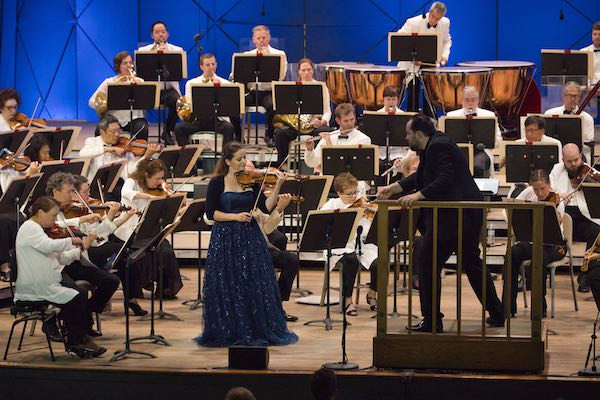Concert Review: The Boston Symphony Orchestra Performs Carlos Simon, Sibelius, and Dvorak
By Jonathan Blumhofer
The orchestra’s summer home is operating at reduced capacity this season, but it’s wonderful to have the BSO and its public reunited.

Boston Symphony Orchestra music director Andris Nelsons leads violinist Baiba Skride. Photo: Hilary Scott.
The Boston Symphony Orchestra’s (BSO) 16-month-long pandemic-necessitated hiatus from live performance finally ended this weekend at Tanglewood. Shuttered last year, the orchestra’s summer home is operating at reduced capacity this season; while the grounds are open, most of the buildings remain closed to the public, and the orchestra’s season is cut to just seven weeks.
Still, it’s wonderful to have the BSO and its public reunited.
This weekend’s concerts were both led by music director Andris Nelsons. The first, on Saturday night, was an all-Beethoven affair. I couldn’t attend that one but did catch Sunday’s matinee. It featured a program that played to Nelsons’s strengths: a short opener by Carlos Simon, followed by Jean Sibelius’s Violin Concerto, and Antonin Dvorak’s Sixth Symphony.
The Simon, Fate Now Conquers, is an attractive curtain-raiser. It takes rhythmic patterns from the second movement of Beethoven’s Seventh Symphony and reworks them into a seething, layered moto perpetuo. Lyrical episodes offer occasional respites, but the music’s tempestuous opening mood never fully dissipates. While the music hardly moves in predictable directions, it carries the listener along easily enough — in large part because of how craftily Simon shapes his materials.
Nelsons and the BSO, who had performed Fate Now Conquers on a videotaped concert earlier this year, gave a robust live account of the piece. The composer was on hand to bask in some well-earned cheers.
Another quality of Fate Now Conquers is that it seems to know exactly what it has to say and how to do that succinctly. The piece is just five minutes long, and Simon doesn’t waste a bar. Many composers have taken twice as much time (or more) and stated less.
Among the latter, occasionally, was Antonin Dvorak. His 1881 Symphony no. 6 is many things: warm, lyrical, sunny. But also, not infrequently, verbose.
So, it’s high praise to say that Nelsons and the BSO delivered a reading of the piece on Sunday that made one, if not forget, then, at least, not mind Dvorak’s rhetorical excesses in it — even during a steady drizzle on the Great Lawn.
No, this was a fine Dvorak Six. Tempos moved smartly. The first movement was sweet and songful from the downbeat and atmospheric when needed (such as over the opening half of the development). So, too, the gorgeous second, its abundance of radiant melodic writing unfolding with melting clarity and sumptuous tone. The rustic Scherzo proved plenty limber, while the finale, its echoes of Brahms’s Second Symphony shimmering, unfolded resplendently.
Indeed, this was a special performance: woodwinds and brasses were conspicuously well matched, and the full ensemble seemed to be playing with a singular sense of purpose and energy.
Those two adjectives also applied to violinist Baiba Skride’s account of the solo part in Sibelius’s Violin Concerto. Presented in its finished form in 1905, the Sibelius is one of the most daunting concerti in the repertoire, blending moments of ethereal beauty with staggering virtuosic demands.
Skride intuited both those extremes — and pretty much all else in between.
Her take on the expansive first movement was free and rhapsodic but never wanting for intensity. The second was shaped with knowing clarity and a penchant for extremely soft dynamics that sometimes resulted in imbalances with the orchestra. Still, the spirit of her reading here was fervent — as it was in the wild finale, which gamboled as brilliantly as its rhythmic patterns danced awkwardly.
Nelsons led the BSO in an accompaniment that was, in the main, well balanced and blended. Tempos were sometimes a bit broad (particularly in the first movement) but the larger reading worked: rhythms were taut throughout and, as in the Dvorak, the low woodwind and horn writing spoke bitingly.
Jonathan Blumhofer is a composer and violist who has been active in the greater Boston area since 2004. His music has received numerous awards and been performed by various ensembles, including the American Composers Orchestra, Kiev Philharmonic, Camerata Chicago, Xanthos Ensemble, and Juventas New Music Group. Since receiving his doctorate from Boston University in 2010, Jon has taught at Clark University, Worcester Polytechnic Institute, and online for the University of Phoenix, in addition to writing music criticism for the Worcester Telegram & Gazette.
